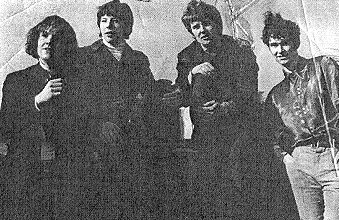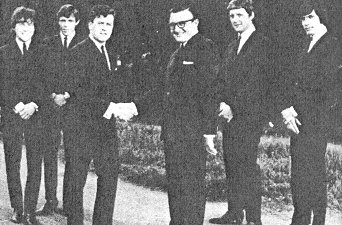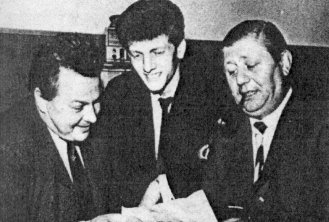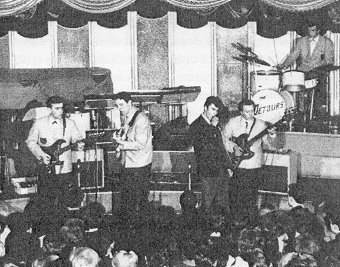| Goblin Ready Meals
And Ambrosia Creamed Rice. Continued
Some managers had their own origins
in the local group scene, having been former members of
earlier groups. One such example was Dixie Dean
who had been one of the area's foremost rock 'n' roll
artists of the late fifties, leading his own Dixie
Dean's Combo. He became manager of Jason Cord and
the First Chapter. He is, unfortunately, no longer
with us. Another former member of one of the first beat
groups in the area who became a manager was George
Maddocks. He was the drummer with the Strollers
and became manager of the Staffords. Later, he
was to become manager of the Club Lafayette, one
of the area's foremost venues of the late 60s and early
70s. Another former member of the Strollers was
Tony Perry and he also was to become directly
involved with the management of Trapeze, the
area's first 'supergroup'. Both men were partners in
PMA, a company which promoted many of the main
venues in the area, and later joined the Astra Agency
which handled affairs for most of the main local groups.
George
Maddocks remembers that
his involvement with the Staffords started as a
result of a newspaper advertisement:
“I read an ad
in the local paper which described how a local group was
seeking a manager. I went along to listen to them and
was reasonably impressed. I took them on."
"The first
thing needed was a change of image and so we bought new
wine-coloured suits and slim ties. I suppose this was in
about 1965. I gave them the name but I can’t remember
why I chose the Staffords. I then began to promote a
regular Saturday gig at Sedgley Parish Hall because
that’s where the Staffords came from. Tony Perry and I
started to promote more gigs at other venues for other
groups."
Hugh Stirling
was the lead singer with the Staffords and he
describes the advantage of having an established
manager:
"We started
as an amateur outfit from Dormston Youth Club, playing
very small venues in the immediate area. When George
became our regular manager, our access to other and
bigger venues also increased. He had the experience of
working with a fairly successful group like the
Strollers and he had links with Astra which at that time
was the main booking agency in the area. There was a
very definite advantage in having someone whose
involvement was in the organisation rather than as a
member of the group." |

Staffords.
An early photograph of the group. They were managed by
George Maddocks, the former drummer with the Strollers
and they had one of the best lead singers of all the
local groups in Hugh Stirling (centre right). (Hugh
Stirling) |
Without any
doubt the most colourful and celebrated of all the local
people involved in group management in the 60's was
Roger Allen.
During the
research for this book, no-one was mentioned as often as
he was, or was perceived from so many diverse
perspectives!
He could with
some justification be described as 'Wolverhampton's
Brian Epstein'.
In his own
words: |
| "I always saw myself as
something of a Brian Epstein in that I felt that once
one of my groups had broken through then it would lead
to others getting their moments of glory. In other
words, once the Beatles had become so successful, other
Mersey groups like Gerry, the Fourmost, Billy J. Kramer
etc. also had success, despite being very limited in
talent. Success breeds success. The biggest problem was
that the area lacked a group who wrote most of their own
material and therefore lacked that originality. The
nearest was Slade, but by the time they had made it big,
they were no longer with me or really based around
here."
In January 1966 Midland Beat
gave the front page over to Roger Allen and two
of his groups, Finders Keepers and the
Montanas. The headline used was THE MAN BEHIND
THEM. The story included the following
paragraphs:
’Something
shared by two of Wolverhampton’s top groups, Finders
Keepers and the Montanas, is the enthusiasm of their
manager, Roger Allen, who spends as much time as
possible with the groups he represents.
Roger doesn’t
send his groups off to Germany and then sit back in
Staffordshire hoping everything goes off well for them.
He makes a point of visiting the venues they are booked
into to check on the conditions for himself.
Mr. Allen
went with Finders Keepers to Cologne and accompanied the
Montanas to Duisburg and Frankfurt. And he was with
another of his promising groups, Sheila Deni and the
Black Diamonds, in Wuppertal.
Apart from
sending his own groups to Germany, Roger negotiates
appearances for others over there, but any groups paying
a visit arranged by his agency have the satisfaction of
knowing that he has first-hand knowledge of the venues
concerned.'
Quite a glowing
testimonial! |
| He began his agency from the
front room of his house at 30 Merridale Street West, was
one third of PMA (Perry Maddocks Allen),
moved his agency to larger premises in Tettenhall High
Street, joined with Astra, opened the Oasis Night
Club and later worked with the Nita Anderson Agency.
He had some management involvement
with the majority of the town's best groups in the 60s,
starting with the Strollers, then the Black
Diamonds, the Montanas, Californians,
Finders Keepers, Ambrose Slade etc.
Perhaps, he personified the period better than most
anyone. Once again as he says: |

Roger Allen.
One of the most influential men in the local group
scene. He was responsible for the management and
promotion of most of the more successful groups in the
town. Here is seen with the Montanas arranging yet
another deal. He is centre left. |
|
"None of the
local groups stood any chance of really making it big
without involvement from the London agencies and without
recording contracts. That was why I spent so much time
down in London. I was probably there for about two
years, living down there every week day and coming back
to Wolverhampton at weekends."
"However long
you peddled your wares in London you were always having
to cope with influential individuals who could make or
break you and your product. The very best example was a
man named Maurice King who was incredibly powerful in
the business and had quite an effect on the degree of
success enjoyed by many of our local groups."
"Getting
recording contracts and better bookings was very much a
case of getting to the top man and hustling. It was no
use just sitting in waiting rooms for hours, if not
days, on end. You had to force your way in and push the
product. That was how I got a contract for the Montanas
with Pye, and for the Californians and Finders Keepers
later with other labels. It was also how you got your
group included on important national package tours. By
the time the 'N Betweens or Ambrose Slade, as they
became known, got to Jack Baverstock and Fontana I was
probably known all over London."
While Roger
Allen is possibly the best remembered of the local
individuals involved in the 60s music scene, one
organisation which is also synonymous with the period is
the Astra Agency. Once again, virtually every one
of the significant local groups had links with Astra.
The Agency had
its beginnings in the front room of a house in Hilston
Avenue in Penn, belonging to Len Rowe. He and a local
band leader named Stan Fielding and his son Peter
Fielding, started the agency in early 1963. Within a few
years Astra was recognised as one of the most important
entertainment agencies in the Midlands. It had started
with the intention of finding regular work for the
growing number of local beat groups which emerged after
the success of the Beatles. In its earliest days it had
responsibility for groups like the Strollers
(with Roy Grant), Roger and the Dodgers (Rinky
Dinks), Johnny Washington and the Congressmen
and the Midbeats and venues like the Civic
Hall in Wolverhampton where it organised the very
successful Rhythm Rendezvous on Monday evenings.
As Midland Beat stated in December 1963:
'The Astra
Agency sets a fine example to other such organisations.
They refuse to take work on more groups than they can
find work for. This is their main policy since they will
not exploit a group. They have been responsible for the
Monday evening sessions at the Civic Hall in partnership
with the Council. On the first night 900 teenagers
turned up, now a regular 600 attend.' |
 |
Astra
Agency. Very few
promotions within the town did not involve Astra Agency
and its three leading members, Stan and Pete Fielding
and Len Rowe. |
In February 1964 the Agency had
moved to offices in Waterloo Road to cope with the
increasing amount of work. By August 1964 the agency was
advertising itself as having booking responsibility for
the:
Strollers |
|
Matchmakers |
|
Black Diamonds |
|
Montanas |
|
Dale Gibson and the
Detours |
|
Barons |
|
Vince Knight and the
Sonnets |
|
Motions |
|
Memphis Cut-Outs |
Steve Brett and the
Mavericks
|
|
| In other words, there were very
few of the more successful local groups (notable
exceptions were Tommy Burton, Herbie's People,
Giorgio and Marco's Men) who were not linked to
the agency in some form, and so it continued throughout
the decade with the Agency becoming bigger with the
involvement, at various times, of other individuals like
George Maddocks, Tony Perry, Roger
Allen, Dougie Eades, Maurice Jones and
Alan Clayton and with the opening of new offices
on the top floor of the Criterion (now Wolverhampton
University Higher Education Shop) on the comer of
Princes Square in 1967 and later at the Club
Lafayette in Thornley Street. |

Dale Gibson
& the Detours. Another
winner of the Big Beat Contest at the Gaumont in
Wolverhampton. He was quite an exciting performer. |
|
When Tony
Perry and George Maddocks joined with Astra
from PMA in about 1967 it meant that the vast
majority of the main music venues in the local area were
then controlled by the agency. This coupled with the
number of local groups on their books and their links
with agencies in other areas like Stoke, gave Astra a
very strong hold over the local music scene.
Astra also
indulged in some 'interesting' experiments in live
entertainment during the mid-60s. It was Astra which
introduced the Cinediscodollyteque at the end of
1966 which could legitimately claim to be the first
local attempt at 'disco'. The music columnist for the
Express & Star was John Ogden and he reported
on the introduction of the CDDT in Wall Heath. The idea
was to have girls dancing in cages and Astra had
successfully conscripted a number of local girls for the
first experiment. It was intended to have a mixture of
discotheque environment with psychedelic music. Two
weeks later the same columnist reported on a performance
by the Move at Walsall Town Hall which involved
psychedelic music.
It was in 1968
that Astra started making plans for its most ambitious
venture, the development of the former Percy Thomas
Hall or Blue Flame into the Club Lafayette
(as christened by Stan Fielding). It was intended to
make the new club into one of the foremost live music
venues in the area and to provide its customers with a
wide variety of acclaimed popular music performers and
different styles. It proved most successful and gained a
deserved national reputation. It remained open until
1982.
The Lafayette
also provided an ultimate local showcase for those of
our groups who managed to survive the turbulent years of
the decade and to gain some well deserved national
prestige via their high standard of stage and recorded
performance. |
 |
 |
 |
Return to
the
previous page |
Return to
the Contents |
Proceed to
part 7 |
|